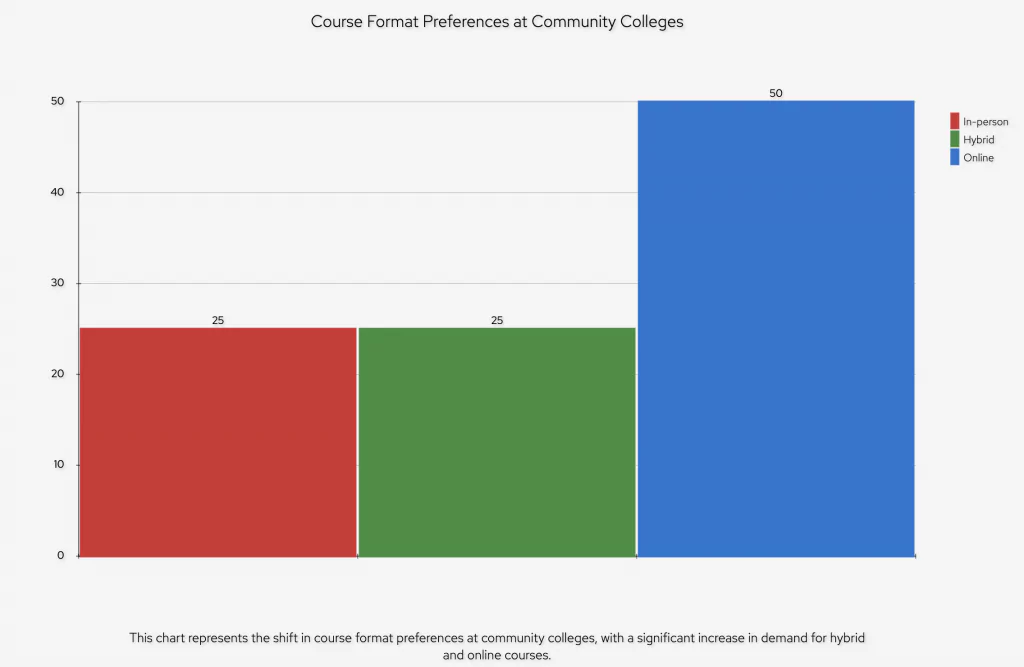
In a shift propelled by the COVID-19 pandemic, community colleges across the United States continue to meet increased demand for online learning opportunities. Many of these institutions are still offering a substantial portion or even the majority of their classes online, an adaptive response to the needs and preferences of their students, reports InsideHigherEd.

✅ AI Essay Writer ✅ AI Detector ✅ Plagchecker ✅ Paraphraser
✅ Summarizer ✅ Citation Generator
Key Takeaways
- The demand for online learning in community colleges has significantly increased, a shift spurred by the pandemic and continued by student preferences.
- Online learning offers the flexibility and accessibility that many students need, particularly those juggling work and family responsibilities.
- As more courses are offered online, colleges need to address the inherent technological disparities among their students, many of whom come from less advantaged socioeconomic backgrounds.
- Online learning presents challenges, particularly in terms of academic outcomes. There are concerns that performance in online courses is weaker than in on-campus classes.
- The pivot towards online learning has significantly transformed the traditional community college landscape.
The Landscape in East Los Angeles College
Consider the situation at East Los Angeles College, the largest campus in the California Community College system. In the recent spring term, 60 percent of its courses were delivered in a hybrid or entirely online format. This is a marked rise from the pre-pandemic era when fewer than a quarter of courses were offered in this manner.
This shift towards online learning, initially sparked by the necessities of the pandemic, has been sustained by the preferences of the student body. Miguel Duenas, the vice president of student services at East Los Angeles, notes, “many students juggling work and family responsibilities prefer hybrid or fully online courses. Students have made their preferences clear via their enrollment trends—online course sections at the college have filled much more quickly lately than in-person courses.”
The Allure of Online Learning Flexibility
Community colleges serve a diverse demographic, including older adults and working individuals. These institutions have been responsive to the rising demand for more flexible learning options. A 2021 California Community College system survey revealed significant student interest in online courses. Over half of the respondents favored hybrid courses, while 27 percent wanted all instruction to be online.
This inclination towards online learning extends beyond California. Other states’ community colleges have also seen the continued demand for online education. At Northern Virginia Community College (NOVA), which has offered distance learning for 42 years, Cynthia Pascal, the associate vice president of e-learning, noted that the number of students taking online courses recently surged, saying, “Between summer 2021 and 2022, online enrollment increased by more than 10 percent.”

Considering the Academic Implications
However, despite the benefits of flexibility and accessibility, the rise of online learning presents its challenges. Nikki Edgecombe, a senior researcher at the Community College Research Center at Teachers College of Columbia University, voiced this concern:
“While online options are more convenient for many students, academic outcomes from online courses tend to be weaker than on-campus courses. We’re still trying to determine, exactly, is that trade-off necessarily worth it. We want students to be successful in these courses and enroll in the modality that really supports their success.”
These colleges are also wrestling with the realities of underutilized campus resources and the demand for faculty members who are willing to teach on short notice.
Bridging Technological Gaps
As the online learning trend continues, colleges must address the inherent technological disparities among students. Kevin Jimenez, public information officer at East Los Angeles College, said,
“Our student population primarily comes from a socioeconomic background that’s a little less advantageous than most people in America. There was a big gap in terms of technology access. Some students didn’t have any internet in their house.”
The Future of Online Learning in Community Colleges
The pivot towards online learning has significantly transformed the traditional community college landscape. It has now allowed students to attend classes at different colleges based on their individual needs and schedules. Kevin Jimenez affirmed this change, saying, “It’s made us all kind of think and look at things differently. I don’t really ever see us going back unless the needs of our students reflect that.”
Despite the hurdles, the move toward online learning represents an evolution in education delivery that many believe will persist long after the pandemic has passed. It is now up to colleges to innovate and ensure that their online offerings are as effective and enriching as their traditional in-person courses.
Related stories:
UK Universities Have Limited Time to Review Students’ Personal Statements
Nebraska University Boosts Diversity in STEM with Innovative Scholarship Program
Universities Adopt New Approaches to Decode the ‘Hidden Curricula’ for First-Time Students
Follow us on Reddit for more insights and updates.





Comments (0)
Welcome to A*Help comments!
We’re all about debate and discussion at A*Help.
We value the diverse opinions of users, so you may find points of view that you don’t agree with. And that’s cool. However, there are certain things we’re not OK with: attempts to manipulate our data in any way, for example, or the posting of discriminative, offensive, hateful, or disparaging material.